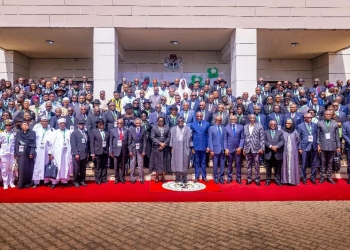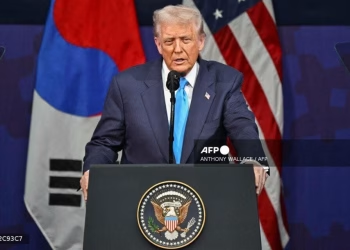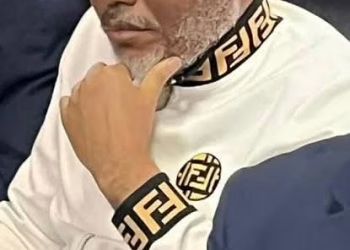By Akaninyene Esiere
Our majestic, even imperial state governors just couldn’t mask it anymore; their loathsomeness and disgust with the country’s attempt, even if feeble, at fighting corruption. 16 of them, out of 36 governors in the country have matched up to the Supreme Court with an uncanny request: that the highest court in the land should declare that the Economic and Financial Crimes Commission (EFCC), Nigeria’s foremost, even though tamed, anti corruption agency is illegal. The governors’ action is a new height in their anti people’s activities since the beginning of the so-called democracy in 1999.
REFLECTIONS! has argued repeatedly that the Nigerian governors are the greatest threat to genuine democracy and the development of Nigeria. They rule their states in a manner that beggars belief. Except in few cases, twenty-five years later, there is hardly any meaningful development in the states. In many cases, the people are left poorer than they were before 1999. As we speak, apart from the federal government’s induced poverty multiplication policy, states have not lifted a finger towards inclusive prosperity. They engage in celebrating tokenisms as if they were philanthropies.
Much of the insecurity in the country, especially in the North East and North West, is as a result of abject poverty due to lack of accountability at the state level. Most citizens of the country live below the poverty line of $2 a day. Many governors achieve next to nothing compared with the amount of money that they get. Much of that money is frittered away by themselves, their families and their cronies. To add pepper to injury, in some states, there are laws that accrue humongous benefits to former governors and their families for life. In Lagos, Delta, Rivers and Akwa States, former governors enjoy pecks meant only for royalties; it does not matter whether the states are poorer or not.
Because they enjoy immunity while in office, a stupid constitutional rule which the late President Umaru Musa Yar’Adua wanted to do away with, the governors do as they please. Hardly any of them leaves office without traces of abashed contempt for probity. And EFCC is always on the trail of our former governors. A case in point is the uncelebrated scandal of attempting to arrest the immediate past governor of Kogi State, the 49 year old Yahaya Bello who is hiding in government house, Lokoja. He reminds me of the way and manner Muammar Gaddafi was running and hiding in tunnels before his death.
And it is his case with the anticorruption agency that made his stooge, Ahmed Usman Ododo to initiate the case at the apex court to prove that the agency is an illegitimate child that should not exist in the first place. The reasoning is that if the court rules in its favour, the criminal case against Bello for allegedly stealing nearly N100 billion of the state funds would have died a natural death. As if on cue, 15 other states decided they should be joined in the case to bury EFCC once and for all so they could be permanently free. These states include Ondo, Edo, Oyo, Ogun, Nasarawa, Kebbi, Katsina, Sokoto, Jigawa, Enugu, Benue, Anambra, Plateau, Cross River and Niger.
In the Senate, many former governors who are senators today, including the Senate President, Godswill Akpabio, have cases of corruption hanging on their necks. The serving governors do not want anyone to come and disturb their lives after leaving government house. So, the way to achieve this is to get the Supreme Court to declare that EFCC, the only institution of government that can come after them, is an illegal entity. Ordinarily, there was no need for the government to establish EFCC because their assignment is what the Nigeria Police are suppose to enforce. But because the same politicians have rendered the police harmless in the fight against financial crimes, the Olusegun Obasanjo government established the agency as a purpose driven vehicle for the curtailment of corruption, easily the greatest threat to the existence of Nigeria as a nation.
That is the agency that the governors, supposedly elected by the people, want dead and buried. The governors’ action just goes to show how this country has been ruled by those who have captured state power these past 25 years. It is worth noting that not all the governors agreed to approach the Supreme Court on this matter. The governors of the other 20 states deserve to be commended for not joining in the case. The governor of Adamawa State, Ahmadu Fintiri who openly commented that he did not think the anti corruption agency should be scrapped, also deserves to be commended for withdrawing his state from the group suing EFCC. The governor of Benue State, Rev. Father Hyacinth Alia even went a step further by suspending his attorney general for joining the state in the case. Anambra and Ebonyi States have also retraced their steps.
To think that the Commission, which can only be equated with a barking only (and not biting) dog, is causing the governors angst is unfortunate. The immediate past President, Mohammadu Buhari, who many, including yours truly, believed would fight corruption head on even whittled down the effort of the agency when he granted state pardon to the only two former governors jailed through the effort of EFCC since its inception. To think that this is the same agency that the current crop of governors are afraid of is simply insane. They do not want to account for their excellent stewardships in office after their tenures.
It is left for Nigerians to continue to tolerate this kind of misbehavior by public servants entrusted with their common heritage.
AVOIDABLE DEATHS IN JIGAWA
It happened before; not once. But many times. The worst was in Delta States in 1998 when we burned over a thousand of our compatriots with our petrol. Last month it was the unfortunate turn of Majia, a sleepy town in Jigawa State. When it was all over, nearly 200 people were killed by petrol, or rather by fuel tanker explosion.
Commiserations poured in mechanically from far and wide. Few weeks later everyone has gone back to normal life waiting for the next turn. Nothing is being done to prevent a repeat of the deadly incident because we have all conspired to make life in Nigeria very cheap.
Should we still be transporting petroleum products in the form that we do? If we had had a highly educated and financially stable population, would we be going to scoop up petrol from a fallen tanker? Had our roads been in good condition, would the tankers be falling off the roads and pouring gasoline on the roads and killing our people? Still more questions begging for answers.
Esiere is a former journalist!
©️2024











